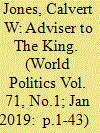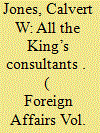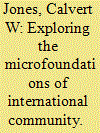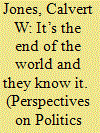| Srl | Item |
| 1 |
ID:
165593


|
|
|
|
|
| Summary/Abstract |
Do experts rationalize and legitimize authoritarian governance? Although research on expert actors in contexts of democracy and international governance is now extensive, scholarly work on their role in authoritarian settings remains limited. This article helps open the black box of authoritarian decision-making by investigating expert advisers in the Arab Gulf monarchies, where ruling elites have enlisted them from top universities and global consulting firms. Qualitative fieldwork combined with three experiments casts doubt on both the rationalization and legitimacy hypotheses and also generates new insights surrounding unintended consequences. On rationalization, the evidence suggests that experts contribute to perverse cycles of overconfidence among authoritarian ruling elites, thereby enabling a belief in state-building shortcuts. On legitimacy, the experiments demonstrate a backfire effect, with experts reducing public support for reform. The author makes theoretical contributions by suggesting important and heretofore unrecognized conflicts and trade-offs across experts’ potential for rationalizing vis-à-vis legitimizing.
|
|
|
|
|
|
|
|
|
|
|
|
|
|
|
|
| 2 |
ID:
166164


|
|
|
| 3 |
ID:
136605


|
|
|
|
|
| Summary/Abstract |
This paper challenges conventional wisdom about the drivers of international community at the individual level. Presenting new data and a novel natural experiment approach to the study of cross-border contact and international community, it tests some of the key microfoundations of international relations theory about how a sense of shared international community may arise and evolve among individuals. The hypotheses are tested using survey data from a large sample (n = 571) of American study abroad students in a range of universities across a treatment and a control group. Surprisingly, findings do not support the main hypothesis that cross-border contact fosters a sense of shared international community. However, the second hypothesis drawn from the liberal paradigm, suggesting that cross-border contact lowers threat perceptions, is strongly supported. The “Huntingtonian” hypothesis that cross-border contact heightens nationalism also garners wide support. The paper concludes with a discussion of the implications for theory and future research, especially the potential of rethinking the drivers of international community at the individual level to rely less on a sense of shared identity and essential sameness, and more on a feeling of “enlightened nationalism” and appreciation for difference
|
|
|
|
|
|
|
|
|
|
|
|
|
|
|
|
| 4 |
ID:
162660


|
|
|
|
|
| Summary/Abstract |
Given that the fictional narratives found in novels, movies, and television shows enjoy wide public consumption, memorably convey information, minimize counter-arguing, and often emphasize politically-relevant themes, we argue that greater scholarly attention must be paid to theorizing and measuring how fiction affects political attitudes. We argue for a genre-based approach for studying fiction effects, and apply it to the popular dystopian genre. Results across three experiments are striking: we find consistent evidence that dystopian narratives enhance the willingness to justify radical—especially violent—forms of political action. Yet we find no evidence for the conventional wisdom that they reduce political trust and efficacy, illustrating that fiction’s effects may not be what they seem and underscoring the need for political scientists to take fiction seriously.
|
|
|
|
|
|
|
|
|
|
|
|
|
|
|
|